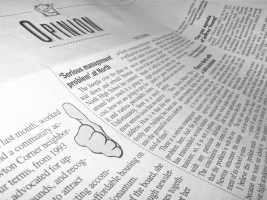How times have changed. Do you remember how, only a few short months ago, we had the police deploying facial recognition software on the streets and threatening anyone who covered their faces with prosecution for ‘obstruction’? Well, here we are in the midst of a lockdown, with people being encouraged by the authorities to cover their faces with masks when out in public. Indeed, when they finally start easing the lockdown and allowing more shops to open, it might even become compulsory to wear masks when shopping. All of which, of course, renders all that intrusive facial recognition technology obsolete overnight. In fact, it renders a lot of the surveillance state – all those CCTV cameras on the street and outside buildings, not to mention in store security cameras – obsolete. Right now, so long as you are wearing your state mandated mask, you can get away with all manner of anti-social behaviour, regardless of how many cameras are watching you. Hell, this lockdown could yet turn out to be a stalker’s paradise. Just think about it: all those potential victims locked up at home while the stalkers are able to get up close and peer directly through the windows, their anonymity protected by their masks! No more having to hide behind the dustbins across the road and use a telephoto lens to cop an eyeful!
Yes indeed, anonymity is back, for a while at least, thanks to a virus. Bearing in mind that we are also increasingly being encouraged to wear gloves, we could become completely anonymous, leaving no fingerprints, with the blessing of government. Right now, anybody could become a budding criminal, secure in the knowledge that most of the commonest methods of detection have been rendered ineffective. This could be a boom time for crime. If only there was anywhere open to rob. I mean, you can’t even become a modern day highwayman and hold people up as they do their daily exercise in the park as nobody uses cash any more – cards are apparently more hygienic and virus free. Perhaps this is why so many Tories are so eager to end the lockdown and get us all back to work – they want to stimulate UK crime by ensuring that there is more cash flowing and more places to rob. That and the fact that they are probably hoping that forcing people back to work will result in more of those horrible working class people getting the virus and dying – not only does it thin out the ranks of potential revolutionaries, but it reduces benefits and pensions payouts in the longer term.
To think, not so long ago, we had all those ‘experts’, (didn’t we have enough of them, until we found out that, in a pandemic, we actually need to rely upon experts?), predicting the end of anonymity and privacy, especially online, as big corporations and governments gathered more and more of our personal data and watched us day and night. Yep, if you were anonymous or were trying to maintain some degree of privacy, you were up to no good, so the orthodoxy went. ‘If you’ve got nothing to hide, then you’ve got nothing to worry about,’ was the mantra of the day. (The counter to which was to respond to anyone peddling such snake oil, ‘In that case, you won’t mind if I film you shagging your wife – you’ve nothing to hide, have you?’). The point I’m sort of working around to is that, right now, I’m seeing lots of so called ‘experts’, (ie, newspaper columnists), speculating as to how this lockdown is going to affect society in the future, with lots of bold claims that ‘nothing will be the same again’. Apparently we’re going to abandon our old lives and, even when the pandemic is over, continue working from home, continue doing our shopping online, etc, etc. Except that we probably won’t – the human capacity for rapidly forgetting this sort of thing and returning to the previous normal is surprisingly high.
The reality is that ‘normality’ is our default setting – we expend much of our time trying to revert to our ‘normal’ everyday: disruptions to our routines are perceived as inconveniences, something to be surmounted or circumvented so as to return to ‘normal’. Moreover, many employers will resist a permanent move to home working, as it reduces their managerial control over employees and weakens their ‘power’ over their vassals, besides, who actually wants to have their job permanently intruding into their homes, blurring the lines between work and personal time? It’s the same with remote shopping: it really is no substitute for the hands on experience of actually seeing the goods before you buy them. It is also fraught with problems, as I found out during my recent flirtation with trying to get my prescriptions fulfilled via an online pharmacy: they just sat on my order until I had run out of some medications, proved to be uncontactable by phone or web chat and their ‘delivery’ turned out to be sending drugs through the post. I’m now in the process of extricating myself from this nightmare and reverting back to requesting the repeat prescriptions directly from my GP to be collected at my local pharmacy – it’s far easier.
But thing is, I don’t know an of this for sure. Just as all these ‘experts’ spouting their predictions of irrevocable changes to society, don’t actually know what is going to happen. We have no real precedent to guide us, so all such predictions are merely speculation which won’t survive contact with the real world. I know that a lot of them have welcomed the reduction in air travel and its concomitant benefits for the environment and are hopefully predicting that this might become a long-term trend. Personally, I suspect that the first thing a lot of people are going to do once things get back to normal, will be to book flights for overseas holidays. But again, nobody knows for sure. I mean, none of these ‘experts’ predicted that one of the effects of the lockdown would be to bring back anonymity as I described above, did they? So how can we rely upon them to predict what will happen post-lockdown?
Doc Sleaze











